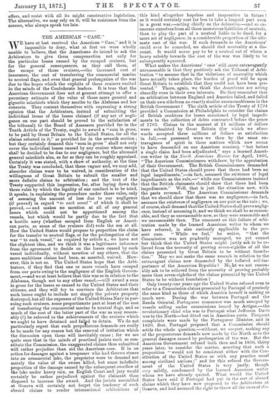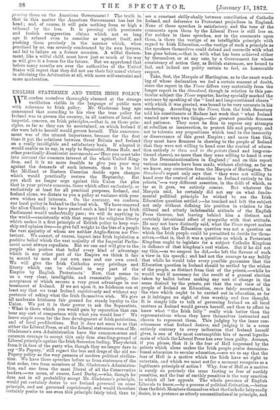THE AMERICAN "CASE."
WE have at last received the American "Case," and it is impossible to deny, what at first we were wholly unable to believe, that the Americans do intend to ask the Arbitrators to give them compensation not only for the particular losses caused by the escaped cruisers, but for the general consequences, as they call them, of the escape of those cruisers,—the increased cost of insurance, the cost of transferring the commercial marine to neutral flags, and even that general prolongation of the war due to the hopes which the exploits of these cruisers excited in the minds of the Confederate leaders. It is true that the American Government does not at present attempt to offer a pecuniary estimate of the value of those more general and gigantic mischiefs which they ascribe to the Alabama and her consorts. They content themselves with expressing a strong opinion that the Arbitrators, instead of submitting the individual items of the losses claimed (if any act of negli- gence on our part should be proved to the satisfaction of the tribunal) to the Board of Assessors provided for in the Tenth Article of the Treaty, ought to award a "sum in gross, to be paid by Great Britain to the United States, for all the claims referred to it," as provided for in the seventh section ; but they certainly demand this "sum in gross" shall not only cover the individual losses caused by any cruiser whose escape shall be decided to be due to our negligence, but the aforesaid general mischiefs also, so far as they can be roughly appraised. Certainly it was stated, with a show of authority, at the time the Treaty was concluded, that these vaguer and, we may add, absurder claims were to be waived, in consideration of the willingness of Great Britain to submit the smaller and more definite claims to arbitration ; and the text of the Treaty supported this impression, for, after laying down the three rules by which the legality of our conduct is to be tried, it speaks, in explaining the procedure under those rules, only of assessing the amount of loss due to our negligence (if proved) in regard "to each vessel" cf which it shall be proved, — and makes no mention at all of any general losses which could not be apportioned among the vessels, but which would be partly due to the fact that a hostile navy (whether escaped from English or Ameri- can ports, as some of the cruisers did) rode the sea at all. How the United States would propose to proportion the claim for the transfer to neutral flags, or for the prolongation of the war "to each vessel," as required by article x., we have not the slightest idea, and we think it was a legitimate inference from the agreement to decide on the losses caused by each vessel individually, without mention of any others, that the more ambitious claims had been, as asserted, waived. How- ever, this is not so. The United States hope that the Arbi- trators, if they find that one or more vessels have escaped from our ports owing to the negligence of the English Govern- ment,—and we at least believe that this was so in relation to the Alabama, though not to any other vessel,—will award a sum in gross for the losses so caused to the United States and their citizens, and they will try to convince the Arbitrators that such losses ought to include not simply the private property destroyed, but all the expenses of the United States Navy in pur- suing such cruisers, some proportionate part at least of the cost of transferring the commercial marine to neutral flags, and so much of the cost of the latter part of the war as may reason- ably (?) be referred to the achievements of the cruisers which we ought to have detained and failed to detain. We do not particularly regret that such prepolterous demands are really to be made for any reason but the renewal of irritation which the discussion upon them will inevitably cause ; for we are quite sure that in the minds of practised jurists such as con- stitute the Commission, the exaggerated claims thus submitted will rather prejudice than aid the American case. If in an action for damages against a trespasser who had thrown stones into an ornamental lake, the proprietor were to demand not merely the value of the swans killed, but some indefinite proportion of the damage caused by the subsequent overflow of the lake under heavy rain, an English Court and jury would certainly be rather prejudiced against the claimant than disposed to increase the award. And the jurists assembled at Geneva will certainly not forget the tendency of such absurd claims to render international arbitrations of
this kind altogether hopeless and inoperative in future ; as it would certainly cost far less to take a languid part even in a great war,—acting chiefly on the defensive,—and so ex- onerate ourselves from all these monstrous liabilities of neutrals, than to play the part of a neutral liable to be fined, for a mere act of negligence, in a considerable proportion of the ulti- mate cost of the war. If such demands as the Americans' could ever be conceded, we should find neutrality at a dis- count. It would never pay to be a neutral out of whom a heavy subsidy towards the cost of the war was likely to be subsequently squeezed.
What makes the Americans' 'case 'still more extravagantly unreasonable is that they positively ask the Tribunal of Arbi- tration "to assume that in the violations of neutrality which have actually taken place, the burden of proof will be upon Great Britain to establish that they could not have been pre- vented." There, again, we think the Americans are acting absurdly even in their own interests. Do they remember that an arbitration between England and America failed, and failed on their own side from an exactly similar unreasonableness in the British Government ? The sixth article of the Treaty of 1794 provided a Commission at Philadelphia to consider the claims of British creditors for losses occasioned by legal impedi- ments to the collection of debts contracted before the peace of 1783. Claims to the amount of 24 millions of dollars were submitted by Great Britain (for which we after- wards accepted three millions of dollars as satisfaction in full,—so possessed were we then by the same ex- travagance of spirit in these matters which now seems to have descended on our American cousins), "but before a single claim had been adjudicated," says a learned Ameri- can writer in the North American Review for April, 1866, "The American Commissioners withdrew, by the approbation of their Government. The British Commissioners demanded that the United States should prove that there had been no legal impediments,".—in fact, assumed the existence of legal impediments as the rule,—" while our Commissioners insisted that the British claimants should show that there had been impediments." Well, that is just the situation now, with the parts reversed. The American Commissioner demands that we should show that there was no negligence,—in fact, assumes the existence of negligence on our part as the rule ; we, of course, shall demand that the United States shall prove neglig- ence, instead of assuming it, and we think we shall be as reason- able, and they as unreasonable now, as they were reasonable and we unreasonable then. The comment on this failure of arbi- tration made by the learned American writer to whom we have referred, is also curiously applicable to the pre- sent case. " While we feel," he writes, "that the Commission was not prudently managed, we yet cannot but think that the United States might justly ask to be re- lieved from the necessity of proving seven-eighths of all the claims presented by Great Britain to be without founda- tion." May we not make the same remark in relation to the extravagant claims now demanded by the inflated self-im- portance of the American Republic ? Might we not reason- ably ask to be relieved from the necessity of proving probably more than seven-eighths of the claims presented by the United States to be without foundation ?
Only twenty-one years ago the United States refused even to refer to a Commission claims presented by Portugal of precisely the same kind as those of which America herself is making so much now. During the war between Portugal and the Banda Oriental, Portuguese commerce was much annoyed by vessels sailing under commissions issued by Artigas,—the revolutionary chief who was to Portugal what Jefferson Davis was to the North—but fitted out in American ports. Frequent complaints were made by the Portuguese Minister, and in 1820, first, Portugal proposed that a Commission should settle the whole question,—without, we suspect, making any of the preposterous demands now made by the North as to the general damages caused by prolongation of the war. But the American Government refused both then and in 1850, thirty years later, to consider the matter, asserting that such a proposition " would not be consistent either with the Con- stitution of the United States or with any practice usual among civilized nations ;" and for this refusal the Govern- ment of the United States is very justly, though very mildly, condemned by the learned American writer whom we have already quoted. What would the United States have said if Portugal had put in the sort of absurd claims which they have now proposed to the Arbitrators at Geneva, and had assumed the right to throw all the onus of des- proving them on the American Government ? The truth is, that in this matter the American Government has lost its head ; and, of course, it will gain nothing from so high a tribunal by the loss. It is pressing with passionate and foolish exaggeration claims which not so long ago it refused even to consider as against itself, and pushing them precisely in the manner which, when practised by us, was severely condemned by its own lawyers, and led to failure on a former occasion. A wilful Govern- ment, like a wilful child, must have just so much of its way as will give it a lesson for the future. But we apprehend that before many months are over the authorities of the United States will regret that they did not use their fair moral victory in obtaining the Arbitration at all, with more self-restraint and more moderation.



































 Previous page
Previous page